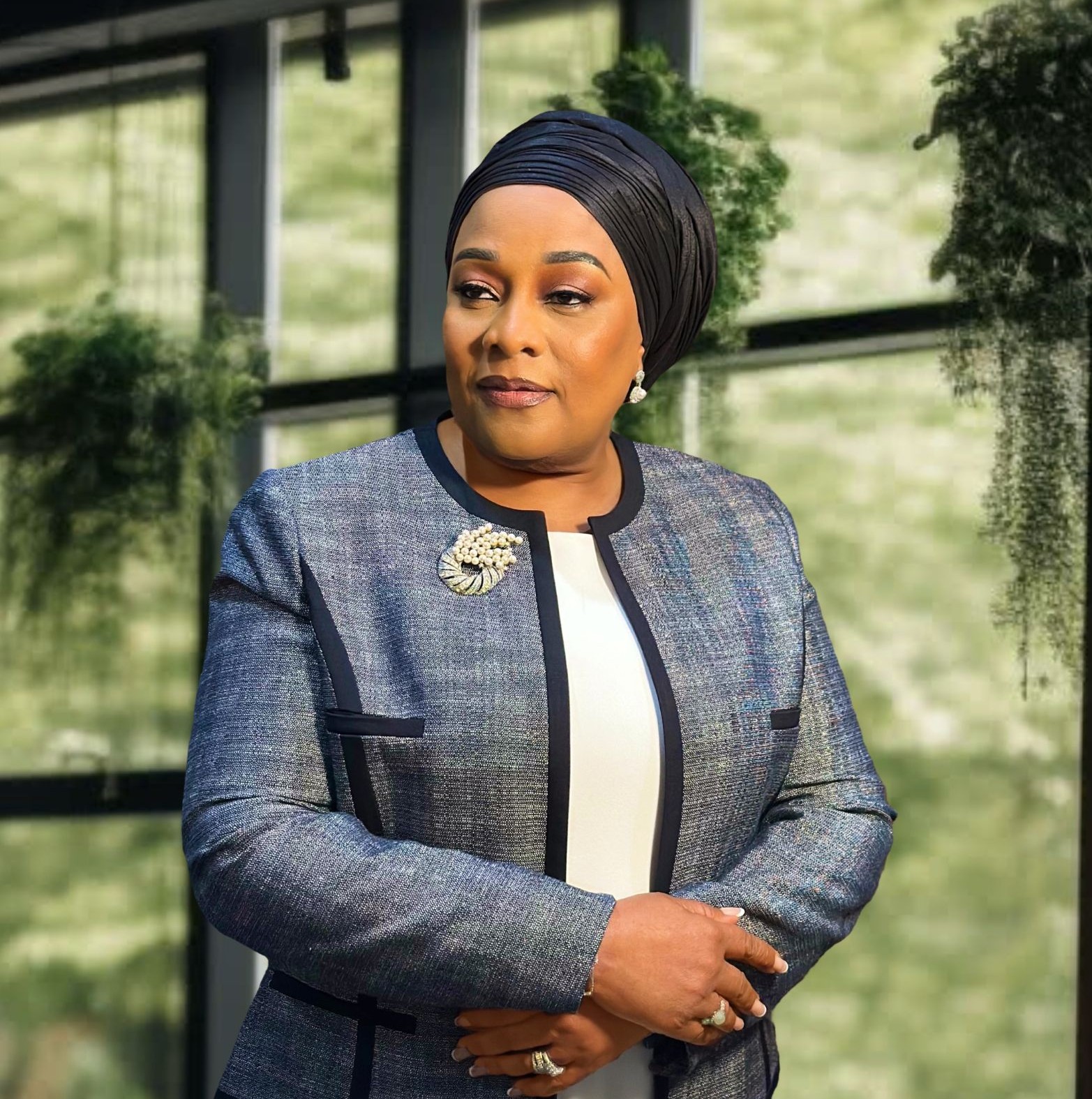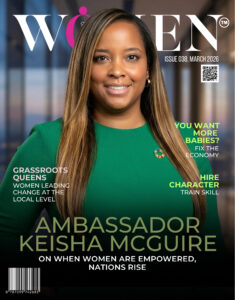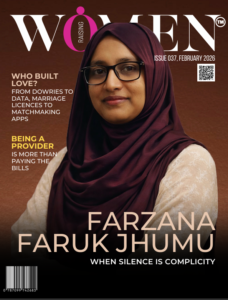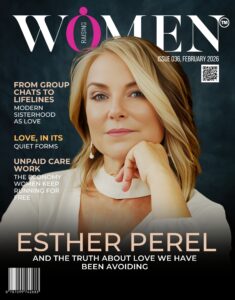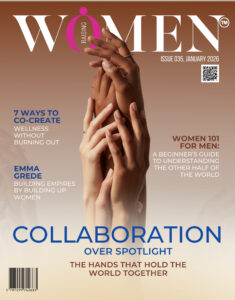Grace, Grit & the Power of Telling It Like It Is
by Oluchi Obiahu
In an inspiring and candid conversation, Senator Margery Chuba-Okadigbo, the first female Chairman of Nigerian National Petroleum Corporation (NNPC) Limited, reflects on her remarkable career, her pioneering role as the first female Chairman of NNPC, and her obligation to upholding her late husband’s legacy while forging her own path. She emphasizes the importance of principled leadership, the value of telling the truth boldly, and the need for women to support one another in politics. She offers profound insights on wealth, legacy, and the importance of staying true to oneself. Senator Okadigbo also shares her thoughts on Nigeria’s economic challenges, urging women to embrace self-reliance and creativity. Her message is clear: true wealth lies in contentment, and lasting legacy is built through integrity and service to others.
Tell us more about Senator Margery Chuba Okadigbo.
My biggest badge of honour is the title “Yaya.” That’s what my grandkids call me. I am a lawyer, called to the bar in 1982, that’s about 43 years ago. I served in the Senate from 2011 to 2015, where I was privileged to be among 108 other Nigerians. That experience meant a lot to me because it involved working with people from diverse backgrounds and ethnicities. Beyond politics, I love real estate. I enjoy seeing things grow from rubble to beauty. I’m a creator at heart, a mother, and I love to travel.
Q: As a prominent female leader, what does “The Woman: Her Worth, Wealth, and Well-being” mean to you? How have you embodied these principles in your personal and professional journey?
When we talk about a woman’s worth, wealth, and well-being, we’re not just speaking about her as an individual. We’re talking about the impact she has on those around her.
For me, being the firstborn and the first female in my family meant I naturally took on the role of a little mother. I had to instill discipline in my younger siblings and take responsibility for them in my parents’ absence. That experience shaped me early on.
I’ve never subscribed to peer pressure. Some people feel the need to do things just to belong, but I believe you should be your own standard. Aim to be a model for others rather than seeking validation from them. If you hold strong values, people around you will recognize them and may even choose to emulate you. You should be your own yardstick.
Wealth, to me, is contentment and fulfillment. It’s relative.
“True wealth is about finding joy in simple things and not being driven by external expectations”
For example, I can pick up a piece of Ankara or Adire, put a neck on it, wear it with my head held high, and if I want added height, I tie a gele. That’s wealth for me. It’s all about how you see yourself.
Some people equate wealth with arrogance or material possessions, but happiness isn’t found in designer bags. I can carry my things in a simple bag and be completely content. What matters is the value you attach to things. Wealth isn’t just about money; it’s about fulfillment and contentment. It’s about being able to hold your head high, regardless of what you’re wearing or what you own. It’s about inner peace, not external pressures.
Well-being, on the other hand, is about taking care of yourself. Sleep, for example, is essential, not necessarily deep slumber, but simply resting.
Create a peaceful space for yourself, even if it’s just drawing the curtains in your room, lying down, and enjoying some quiet. That’s what well-being is all about. Make time for yourself. If you have young kids, shut them out for a moment and retreat to your own oasis. Create an environment where you can be at peace with yourself. “Me time” is essential.
As women, we carry so much responsibility, including for our husbands, who are often our first children (laughs). My late husband used to say, “Treat me like your first child,” and it worked. You must understand that individuals come from different backgrounds and have different personalities, so you’re bound to accommodate. That’s how we women are molded, we’re built to be shock absorbers. But you must also make time for yourself. Know that you’re not Hercules. Take time to look after yourself; read, pray, meditate, watch a movie, or simply laugh at fond memories. Don’t take life too seriously. While we’re often the backbone of our families, that doesn’t mean we should neglect ourselves. Taking time to relax, reflect, and enjoy life is vital.
Q: Many women struggle with financial independence and economic empowerment. What advice do you have for women looking to build wealth and secure their financial future?
Again, as I said earlier, wealth is relative. If I want to travel, and I love to travel but all I’m thinking about is how to fly first class, I’m already putting pressure on myself.
However, if I can afford to fly economy and I know that the trip will contribute to my well-being, I’ll focus on the trip itself, not the mode of travel. Those are the kinds of pressures we often place on ourselves.
“What works for you may not work for me. The little, simple things in life, believe it or not,
often bring the greatest joy”
For example, I might spend one Naira and derive immense happiness, while someone else spends a hundred Naira and feels no joy. Why? Because I’m surrounded by people I love, my family and friends, and we’re having a good time. Meanwhile, the person with a hundred Naira might be sitting alone in misery, lacking those simple joys.
Some people equate wealth with arrogance or material possessions, but that’s not true happiness. Carrying the biggest designer bag doesn’t guarantee joy. If I carry my things in a simple nylon or paper bag, I’m content because I’m not worried about someone stealing it. That’s one less pressure off my shoulders.
Ultimately, it all depends on the value you attach to things. If you don’t place undue importance on material possessions, they lose their power over you. Wealth isn’t about external validation; it’s about finding joy and fulfillment in what truly matters to you.
Q: You have successfully built your own political and professional legacy while honouring your late husband’s contributions. How did you navigate this journey, and what were the key challenges you faced?
When people mention my husband’s legacy, they often refer to his political influence. But for me, leadership is about principle. Politics is full of compromises, but one must never sell their soul. The key question is: Are you in this for yourself, or for the greater good?
If you are in politics for the general good, it will take you far. If you are in it only for yourself, your journey will be short-lived. Many people today enter politics for personal gain rather than to serve, which is a shift from the values I was raised with.
Politics is murky water, no doubt about that. But you have to ask yourself: Why am I here? Am I here for myself, or am I here to serve others? If you understand that you’re in it for the greater good, you’ll go far. If it’s only about yourself, you won’t last long.
The politics I knew and grew with is not what I see today. Back then, it was about serving people. Now, it’s often about self-interest. Even when people do good, they want it to be publicized. But true service doesn’t seek recognition. As the Bible says, “Let not your left hand know what your right hand is doing.” Genuine good deeds don’t need to be broadcasted.
When I do things for people, I don’t talk about it because it’s nothing to boast about. It’s voluntary. Sometimes, years later, someone will remind me, “When you were in the Senate, you did this or that for me.” I often don’t even remember, but I’m glad to hear they’re doing well. That’s the joy of service, knowing you’ve made a difference in someone’s life.
It’s like when you meet a former teacher years later. They may not remember you, but their first question is, “Where are you now? What are you doing?” That’s their pride, knowing they played a part in shaping you into someone contributing to society. At the time, you might have thought they were tough, but now you understand the impact they had.
That’s what politics should be about, serving others and finding joy in making a difference.
Q: What principles guide you in upholding your husband’s legacy while also forging your own leadership?
The Chuba Okadigbo Foundation was established by my late husband before his passing. It’s a foundation that I know exactly what he intended it to be, focused on education, particularly for the less privileged and especially for widows. Ironically, he didn’t know that he would be leaving behind a widow himself.
It gives me joy to be able to pay school fees for children and contribute to people’s progress in my own little way.
Q: You have maintained remarkable poise and vitality over the years. What are your personal philosophies on self-care, aging, and overall well-being?
In terms of aging, I think what I’ve succeeded in doing for myself is keeping young people around me, my children and their friends. Over the years, I’ve related to them as if we’re friends. It helps, and it also helps me understand my children better, advise them better, and be their friend. I attend their events, spend time with them, and even use their slang (laughs). By being in their space, I can offer guidance in a way that doesn’t feel forced. They see me as a friend, not just a mother, which makes them more receptive to advice.
There’s no month that goes by where I don’t go out with the kids. I even attend their events, birthday parties for their children and so on. Sometimes, I’m probably the only grandma in the midst of it all, but it’s something I enjoy doing. When you’re around young people, you see things differently. You maintain your youthfulness by being around them. You interact with them more, and you’re even in a position to advise them better, advise them as if you’re their peer, not their mother or auntie.
They take it better when you relate to them on their own platform. The only way you can do that is to be in their space, not them in yours. You have to go to their space, and that way, you can advise them better. They are more open at that point. They talk to you as a friend, not as a mother.
I’ve learned a few of their jokes and slang, and I use them with them. At that point, they also know that I understand what they’re talking about. So, it’s very important to be friends with your children and their friends.
Q. Many women admire how well you have kept yourself. You are an inspiration. Could you please share your approach to staying physically, mentally, and emotionally strong despite the pressures of public life, which can be so demanding?
I don’t let the pressures of public life rule me. Unfortunately, many politicians feel they have to identify with or belong to a certain group. Every four years, things change, power shifts, new people come in, and old people exit. It’s like a revolving door in politics. Some people feel they have to keep up with the cycle, but for me, I don’t think that’s necessary.
If you’re politically astute, you’ll know that in politics, the only thing that changes are interests. People don’t change; their interests do. So, if you keep your friends within the political circle, you won’t lose them. You don’t need to prove anything. They know your worth, and when certain opportunities arise, they’ll remember you. They’ll say, “Oh, I remember this lady. I was with her in the other party.”
People change parties all the time. For example, I belong to the APC, the ruling party. If I see someone from the PDP take up an appointment in the APC, my first reaction might be one of upset. “Why should they reward someone from the PDP?” But then I remind myself that it’s possible someone in the APC used to work with that person in the PDP and knows the value they brought to that circle. So, they bring them across.
As a party loyalist, the initial reaction might be, “Oh no, this isn’t right. I’ve been here.” But then you have to prove yourself. It’s not enough to stay within the party and feel entitled if you’re not bringing value to the table. On the flip side, there are people within the party who are giving their very best. They may be silent workers, but they’re not being rewarded because they’re not the type to say, “Here I am, notice me.”
I’m like that. I do my job behind the scenes. When I was Chairman of the NNPC, the Petroleum Industry Act (PIA) gave us 18 months to transition the old NNPC to the new NNPC. We did it in six months because I had a strong team to work with, both on the board and in management. Achievements, successes, and goals come from leadership, and at that time, the board was the leadership. I just happened to be sitting as chairman, but I couldn’t have done it alone. Without that strong team, we wouldn’t have achieved what the Act gave us 18 months to do in just six months.
It was tough work. Sometimes, we didn’t leave the Towers until 2a.m., but we needed to do it, and we achieved it. I beat my chest to say that I did it, and I’m happy to say I did it without any scandal. No one can call my name and question what happened. Even if they did, I’d tell them exactly what happened, to the best of my knowledge.
For me, this is also part of my husband’s legacy; to live a life of principled leadership. Principled leadership is very important. The legacy he left behind is something I won’t compromise. There’s a name, a standard that was set, and I tell my children the same. They must uphold that legacy. They’ll go through changes, and people will say, “Oh, but you’re the son of this, the son of that.” No, they are their own persons. They’re just privileged to carry that name.
Having been privileged to inherit that name, it’s their responsibility to ensure they don’t tarnish it. That memory must not be tarnished. They didn’t build it; someone else did.
Q: Looking at Nigeria’s current political landscape, what do you see as the most pressing issues? What role should women play in shaping the future of governance?
The political landscape today is dominated by economic concerns. Everyone is talking about the economy, and it’s not just a Nigerian issue, it’s global. Whether you call it a recession or a crisis, it’s affecting the world. When I speak to friends abroad, they tell me how the price of a dozen eggs has skyrocketed. My first reaction is, “Welcome to the reality of the world,” because it’s a widespread phenomenon.
I believe women need to start looking inward. That little patch in your backyard? Think about how to turn it into a garden or a small poultry farm. Remember how our parents or for my generation, our grandparents, hardly went to the market for fresh produce? They grew their own vegetables and raised chickens. If unexpected guests arrived, they could simply go to the backyard, get a chicken, and prepare a meal. These are practices we need to revisit.
Years ago, trips to the village were exciting because you’d return with palm oil, yams, plantains, and other produce loaded into the trunk of your car, all for free. These were things we took for granted. Now, the younger generation in the village moves to the city, and those traditional economic practices are disappearing.
In the past, large families with many wives and children had economic benefits. The size of a family often correlated with the amount of farmland they could cultivate. Wealth, especially in Igbo culture and much of Africa, was measured by your produce. A full yam barn signified wealth, and for women, a thriving chicken coop was a mark of prosperity. Even the stack of firewood in your backyard had economic value, you could lend some to a neighbor for cooking.
Over time, these practices have eroded due to societal changes and human development. But I think it’s time we start looking back. We have so many graduates today, but many lack creativity. Everyone is looking to the government or private companies for employment, but as a young graduate, you can create opportunities for yourself.
The clothes I wear, for example, are made by young designers. Videography, makeup artistry, wig-making, these are all areas where young people can thrive. There’s always a need in society. I know a young girl who makes wigs, and she’s doing incredibly well. People who do makeup are also in high demand.
Honestly, I’ve come to believe that those who rely solely on government jobs are limiting themselves. Government work often involves following a routine, but when you run your own business, you have to be creative. In a government job, if you try to innovate, you’re often accused of being “too forward.” People resist change and prefer the same routine day in and day out. But when you’re in charge of your own business, you have no choice but to be creative, otherwise, you’ll stagnate.
There’s so much young graduates can do, and it’s not just about formal education. Education goes beyond the classroom. You can have all the degrees in the world and still lack practical skills. There are countless ways to grow and succeed.
As mothers, we should encourage our children to explore these opportunities. We need to teach them that there’s so much they can achieve on their own. Mothers should also learn to speak up. Many mothers don’t even talk to their children. There’s an Igbo saying: “No child is bigger than their parents.” If you pretend your child is bigger than you, the pain will eventually be yours. Another saying goes, “Spare the rod, spoil the child.” These truths remain relevant.
For women in governance, it’s not just about holding executive positions. Even in politics, I must say, and some people may not like this, I find it frustrating when political gatherings relegate women to the role of cheerleaders. As a woman, I know I’m worth more than that.
One of the biggest challenges is that women often don’t support each other. If you have three candidates, two men and one woman, and the majority of voters are women, the woman will likely lose because women won’t vote for her. I keep asking: How can we demand political empowerment, femininity, and woman power if we don’t support ourselves? If you don’t give it to yourself, how do you expect to get it?
We celebrate International Women’s Day, but how many women truly support other women? Men have learned to use us against ourselves. They’ve perfected it. Otherwise, how does one man control four wives? He’s mastered it because we’ve allowed it. We don’t support each other.
My message to women is the same one we’ve been giving for years, but I hope one day it will change: Support your fellow women. It’s crucial. When women rule the world, we will see the difference.
Q: As the first female Chairman of NNPC, what were your priorities for the oil and gas sector?
Well, I’m no longer the chairman of NNPC, but I was the pioneer chairman. As I mentioned earlier, there was a significant burden on me to transition the old NNPC, which had existed for many years, into a new structure within six months. The goal was to reorganize the company to reflect true corporate principles and apply good governance. It was a lot of work, and even though I had a five-year tenure, I completed the task in two years. After that, the new administration made their own adjustments.
I believe the two years I spent were foundational in terms of implementing the changes we initiated. It’s now up to the current chairman and board to build on where we left off. Thankfully, the current chairman of NNPC was on the board with me, so he understands the values and intent behind our work. I’m confident he can continue from where we started. With my board of directors, we laid a solid foundation for the current board to carry forward.
Q: We’d like to learn more about the legacy you hope to leave behind. You’ve already given us insight into your husband’s legacy and how you’ve kept it alive. What legacy do you hope to leave behind as a public servant and as a woman who has done so much for future generations?
I listened to your question, and I don’t always agree with the idea of asking, “What legacy do you want to leave behind?” I believe you’re already leaving your legacy by the way you live now. Life is short. By the time you turn 35, and many young people don’t realize this, you’ve already lived half of your life. If you go by the biblical “three score and ten,” which puts life expectancy at 70, then at 35, you’ve lived half of it. Everything you do afterward is about consolidating those 35 years
Even within those 35 years, if you subtract 18 (or 21 in some countries), you’re left with about 15 years of true adulthood. The rest of your life should be about building the legacy you want to leave behind. If, as a young person, your legacy is laziness, gossip, or negativity, that’s what you’ll be remembered for. Some say people don’t change, but I disagree. Time and circumstances can change anyone. Certain events in life can cause a complete turnaround, making you see things differently..
For me, the most important legacy is being able to tell your truth and tell it boldly. This is something I learned from my late father. Telling the truth is difficult because it can cost you relationships. Some people don’t take kindly to hearing the truth. But if you’re committed to telling the truth, you must be ready for that. What matters is that you’ve purged your conscience and spoken honestly. That’s the way I live.
So the legacy I hope to leave behind is that of a woman who told her truth boldly, even if it come at a cost. That to me is very important.

